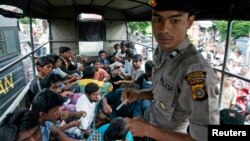JAKARTA —
A boatload of 121 Muslim Rohingya fleeing Burma arrived off the Indonesian coast of Aceh this week. They are just some of thousands of Rohingya fleeing Burma by sea, in a deadly exodus that the United Nations plans to discuss at a conference in Jakarta next month. Human rights groups worry the situation could lead to more sectarian violence.
Tensions between Burma’s Rakhine Buddhists and ethnic Rohingyas have festered for decades.
Violence erupted last year when communal attacks in Arakan state left hundreds of Rohingya Muslims dead, and 100,000 displaced.
Last week, an angry Buddhist mob targeted a non-Rohingya Muslim community in the capital Rangoon, hurling bricks as they attacked shops and a school. What started the violence is unclear. Some news reports indicated residents mistakenly thought a new mosque was being built.
Nyunt Maung Shein is president of Burma’s Islamic Religious Affairs Council. At an interfaith conference this week in Jakarta, he argued that although recent events have fomented suspicion, relations between Muslims and Buddhists in Burma are mostly harmonious. He said the recent violence in Rangoon was instigated by a small minority.
“It’s more about politics. Actually it is not due to a crisis of religion… It is a political play, not due to the discrimination and religion,” said Shein.
Former Indonesian Vice President Jusuf Kalla agreed. He visited Burma’s Rohingya camps last year and has worked to defuse bloody sectarian conflicts in Indonesia’s Aceh and Maluku.
Kalla said that often conflicts that appear to be fueled by theological differences are underscored by economic, rather than faith-based, issues. “Rohingya is not only a religious problem. Politically, historically, culture, economics, and a religious problem. It is complex,” he said.
Ethnic Rohingyas - some of whom have lived in the country for generations - are denied citizenship in Burma.
The Burmese government has consistently said the Rohingya issue is a question of ethnicity, not religion.
But there are concerns the still unresolved status of the Rohingya is destabilizing a country still in political transition.
Phil Robertson, deputy director at Human Rights Watch, said last week’s violence in Rangoon has exposed the vulnerability of inter-religious harmony in Burmese society. He said "once that discriminatory standard is set that some have rights and some don't, in a multi-ethnic country like Burma, this is a profoundly dangerous lesson to draw because, it opens the door for other sorts of abuses, for other sorts of mob actions."
"And, this is the thing that the international community needs to work with, you know, people of good will in Burma to really sort of draw a line underneath this and prevent further violence from taking place,” he added.
Indonesia has been involved in efforts to resolve the Rohingya issue in Burma.
Last year the Indonesian government donated one million dollars in aid to alleviate suffering in Rakhine state. And Foreign Minister Marty Natalagewa pressed the government to resolve the legal settlement of the ethnic Rohingya.
Tensions between Burma’s Rakhine Buddhists and ethnic Rohingyas have festered for decades.
Violence erupted last year when communal attacks in Arakan state left hundreds of Rohingya Muslims dead, and 100,000 displaced.
Last week, an angry Buddhist mob targeted a non-Rohingya Muslim community in the capital Rangoon, hurling bricks as they attacked shops and a school. What started the violence is unclear. Some news reports indicated residents mistakenly thought a new mosque was being built.
Nyunt Maung Shein is president of Burma’s Islamic Religious Affairs Council. At an interfaith conference this week in Jakarta, he argued that although recent events have fomented suspicion, relations between Muslims and Buddhists in Burma are mostly harmonious. He said the recent violence in Rangoon was instigated by a small minority.
“It’s more about politics. Actually it is not due to a crisis of religion… It is a political play, not due to the discrimination and religion,” said Shein.
Former Indonesian Vice President Jusuf Kalla agreed. He visited Burma’s Rohingya camps last year and has worked to defuse bloody sectarian conflicts in Indonesia’s Aceh and Maluku.
Kalla said that often conflicts that appear to be fueled by theological differences are underscored by economic, rather than faith-based, issues. “Rohingya is not only a religious problem. Politically, historically, culture, economics, and a religious problem. It is complex,” he said.
Ethnic Rohingyas - some of whom have lived in the country for generations - are denied citizenship in Burma.
The Burmese government has consistently said the Rohingya issue is a question of ethnicity, not religion.
But there are concerns the still unresolved status of the Rohingya is destabilizing a country still in political transition.
Phil Robertson, deputy director at Human Rights Watch, said last week’s violence in Rangoon has exposed the vulnerability of inter-religious harmony in Burmese society. He said "once that discriminatory standard is set that some have rights and some don't, in a multi-ethnic country like Burma, this is a profoundly dangerous lesson to draw because, it opens the door for other sorts of abuses, for other sorts of mob actions."
"And, this is the thing that the international community needs to work with, you know, people of good will in Burma to really sort of draw a line underneath this and prevent further violence from taking place,” he added.
Indonesia has been involved in efforts to resolve the Rohingya issue in Burma.
Last year the Indonesian government donated one million dollars in aid to alleviate suffering in Rakhine state. And Foreign Minister Marty Natalagewa pressed the government to resolve the legal settlement of the ethnic Rohingya.




